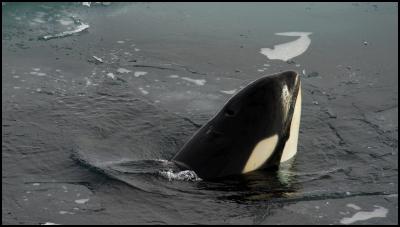Antarctic orcas are South Pacific commuters
26 June 2015
Antarctic orcas are South Pacific commuters

University of Canterbury (UC) scientists and Antarctic researchers from Italy have struck “research gold” by uncovering the commuting secrets of Antarctic killer whales.
Gateway Antarctica scientist Dr Regina Eisert led a team at Scott Base during the 2014-2015 Antarctic summer that studied killer whales as part of a larger research programme on the Ross Sea ecosystem involving NIWA, Landcare Research and Lincoln University.
Eisert says most killer whales near Scott Base are found to be Type-C, which are common in the Ross Sea and thought to prefer fish prey, including Antarctic toothfish.
“We wanted to determine whether a decline in the toothfish fishery in the Ross Sea poses a risk to Type-C killer whales, including finding out how many there are in the Ross Sea and where they feed,” says Eisert.
At the same time, about 360km north of Scott Base, Italian whale experts Dr Giancarlo Lauriano (Institute for Environmental Protection and Research) and Dr Simone Panigada (Tethys Research Institute) deployed satellite transmitters on killer whales in Terra Nova Bay to determine the whales’ movements.
Eisert says the two teams from New Zealand and Italy hit “research gold” when their results independently verified that Type-C killer whales were commuting between Scott Base and the waters off Northland in New Zealand.
UC student Ekaterina Ovsyanikova, whose work is supervised by Eisert and renowned killer whale expert Dr Ingrid Visser from the Orca Research Trust, discovered that the same female Type-C killer whale had been photographed repeatedly in New Zealand and in McMurdo Sound, Antarctica.
“This suggested that the killer whale had been commuting between Scott Base and Northland,” says Eisert.
“Satellite data received by Dr Lauriano and Dr Panigada showed that the whales swam due north towards New Zealand, confirming beyond a doubt the findings suggested by photo-identification of Ovsyanikova and Visser.
“If Antarctic killer whales roam all the way from Scott Base to the North Island of New Zealand, rather than stay in a relatively confined area as some scientists believe, it crucially changes our understanding of the ecology of these key top predators and the potential threats they may face.
“The whales’ long commute would also suggest that there is much greater ecological connectivity between Antarctica and New Zealand than previously thought,” says Eisert.
Eisert has teamed up with Dr Visser, who has been collecting Antarctic killer whale images for decades, as well as Heritage Expeditions and staff and scientists at Scott Base to create the first open-access photo-ID catalogue for Antarctic killer whales from the Ross Sea to New Zealand.
Photo-identification is one of the main non-invasive research tools used to study killer whales and other cetaceans (whales and dolphins). Subtle differences in colouration patterns, nicks on the dorsal fin, and scars on the whale’s body uniquely identify each whale, allowing individual killer whales to be recognised wherever they go. Compilation of whale images into a catalogue allows scientists to follow individuals in time and space, and even estimate the total size of a population.
Dr Eisert is currently working with Antarctica NZ to investigate the possibility of hosting the killer whale photo-ID catalogue on ADAM (http://antarctica.recollect.co.nz/), Antarctica NZ’s cutting-edge new digital asset management platform launched on 18 June 2015. The revolutionary new database, created by Wellington-based company NZMS, is based on a non-hierarchical network structure similar to the human brain, and offers the perfect matrix for curating, using and growing the killer whale photo-ID catalogue.
The findings are the result of international collaboration between UC, Italian researchers, the Orca Research Trust (ORT) and Heritage Expeditions - a Christchurch-based adventure travel company — and many citizen scientists in Antarctica and New Zealand who contributed their killer whale photos and sightings. Antarctic killer whale research is supported by the Ministry of Primary Industries, Antarctica New Zealand, the New Zealand Antarctic Research Institute and Canon New Zealand Ltd.
ends


 Tourism New Zealand: Tourism New Zealand Invites The World To Find Their 100% Pure New Zealand In New Global Campaign
Tourism New Zealand: Tourism New Zealand Invites The World To Find Their 100% Pure New Zealand In New Global Campaign Bill Bennett: Comcom warns 2degrees over satellite marketing
Bill Bennett: Comcom warns 2degrees over satellite marketing Transpower: Major Electricity Development For Western Bay Of Plenty A Step Closer
Transpower: Major Electricity Development For Western Bay Of Plenty A Step Closer Alcohol Beverages Council: Turning The Tide - New Zealanders Unite To Curb Harmful Drinking
Alcohol Beverages Council: Turning The Tide - New Zealanders Unite To Curb Harmful Drinking University of Auckland Business School: Economists Urge Action To Prevent ‘AI Poverty Traps’
University of Auckland Business School: Economists Urge Action To Prevent ‘AI Poverty Traps’ Bill Bennett: Australian warship takes rural fixed wireless broadband offline
Bill Bennett: Australian warship takes rural fixed wireless broadband offline


